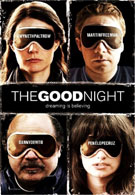Much of The Good Night seems to be lifted directly from other recent films about young men finding their way in a slightly sci-fi version of our world. Our hero Gary (Martin Freeman) is with a dowdy woman (Gwyneth Paltrow) who is in fact a beautiful actress in disguise, not unlike Cameron Diaz in Being John Malkovich. Unhappy with the state of his life, he uses lucid dreaming to connect with his fantasy woman (Penelope Cruz), much in the way Vanilla Sky’s Tom Cruise tried to connect with, well, Penelope Cruz.
It’s not a good sign when your debut film can be so easily compared to earlier, better films, and even though writer-director Jake Paltrow (yes, Gwyneth’s brother) shows some style and genuine human feeling, nothing about The Good Night promises to help him stick out from the pack. Good thing a famous last name usually takes care of that anyway.
The movie’s meandering narrative kicks off immediately, with documentary-style interviews from Gary’s friends in order to set up his life in New York. Basically, he’s miserable. He works as a jingle composer for his philandering best friend Paul (the always-welcome Simon Pegg) and lives with his girlfriend Dora in barely-concealed contempt of one another. When his dreams start arriving, they’re like breaths of fresh air. In various scenic locations, an unnamed woman (Cruz) in a stunning white tuxedo gives him everything he’s been missing in life—namely, a fantasy version of love. When Gary meets lucid-dreaming expert Mel (Danny DeVito), he tries to sleep round-the-clock in order to somehow take control of his dreams and maybe even make them come true.
The faux-documentary style gives out halfway through the film, around the point the story takes its most interesting turn. Gary actually meets his dream woman in real life, only she’s an arrogant model named Anna with no time for Gary’s awkwardness or creepy fetishization of her. Once Anna departs the film loses steam, as Gary must choose between the real world with Dora and his dream life with Anna, particularly when an accident makes the option of eternal sleep a real one.
The problem with this choice is that Gary’s life never seems appealing enough to come back to, even when the other option is death. He and Dora make one another miserable, and we never get to see the love that presumably started their relationship to begin with. Narration tells us that Gary’s work life becomes more successful as he takes control of his dreams, but we never hear the music he comes up with. Paltrow, like Gary, is more invested in the dream world than in the real one, but unlike Gary, he has an audience to please as well. Gary loves his dream woman, but Paltrow never makes us understand what it is about her that makes her so compelling. Gary tells us that she is “passionate and supportive and inspiring,” but we only ever see her gaze alluringly at the camera and pose in a bikini. She’s nothing but adolescent male fantasy, a beautiful woman with endless libido and zero inner life—Barbie with an accent.
Despite its structural flaws, The Good Night features some fine performances—Pegg and Freeman are a joy to watch together—and characters who, while under drawn, earn our sympathy without being cloying or too self-absorbed. Paltrow may have a career as a director ahead of him, but as a screenwriter, his ideas come out muddled and, well, tired. Like someone else’s “fascinating” dream, The Good Night never turns out as interesting as its teller thinks it is.
Staff Writer at CinemaBlend












